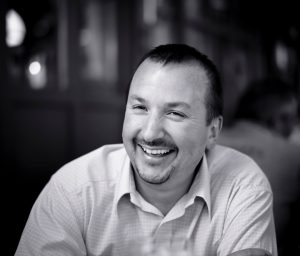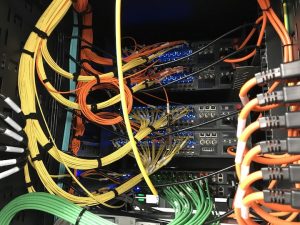SVG Europe Sit-Down: Riedel’s Jake Dodson on changing technological needs and training the engineers of tomorrow

Jake Dodson, Director of Product Management, Riedel Communications
Riedel Communications, founded in 1987, designs, manufactures and distributes innovative real-time networks for video, audio and communications. Alongside providing broadcast solutions, its products are used for event, sports, theatre and security applications worldwide. The company is known for pioneering digital audio matrix systems and fibre-based real-time network technology. Headquartered in Wuppertal, Germany, Riedel employs over 500 people in 19 global locations. Our conversation with Jake Dodson, Director of Product Management, begins with a look at the new year…
Can you tell us Riedel’s plans for 2018?
Following on from our 30th anniversary, 2018 looks to be very busy with a number of large events going on around the world.
2017 saw the launch of our Bolero wireless intercom system as well as the introduction of the MediorNet MicroN IP App. We are working hard to meet the amazing demand for Bolero and are happy to say that we have already substantially exceeded our original volume estimates! The MicroN IP app is a gateway between MediorNet and IP-based networks so we are able to demonstrate how our clients can leverage their current and future MediorNet investments as they plan their transition to IP-based workflows.
Of course, we have made tremendous investments in R&D as we continue to build on our vision of real-time networks for audio, video, data and communications. There’s a lot going on in Wuppertal and you’ll have to wait to see like everyone else!
How have the demands for your technology changed over, say, the last 10 years?

Sky Sport HQ in Germany has one of Europe’s most advanced infrastructures for live sports production
We have been doing real-time networks for quite some time and the industry’s move to IP is validation that we continue to be on the right track. Our market has been moving away from one signal per wire and one job per box for a long time now. For the last few years we have been concentrating on software-enabled hardware as a way for our clients to have common hardware and then firmware “apps” to provide the exact functionality that they need. One size does not fit all and people don’t want to have to spend money on features that they simply do not need.
Broadcasts continue to get more and more complex, so we have to offer solutions that can accommodate the increasing number of signals while reducing overall system complexity. We can do that by having the signal processing “glue” built into our MediorNet systems and by enabling signal networks that can scale simply by adding nodes.
If you had to nominate one specific project that underlines Riedel’s capabilities, what would it be?
The Eurovision Song Contest is a gig that grows each and every year and has become a showcase for what Riedel solutions can do. The Riedel MediorNet backbone consisted of four MetroN core routers and dozens of MicroN high-density media distribution network devices deployed in a mesh topology. This decentralised configuration ensured full redundancy of all video and audio signals for commentary, intercom, signal distribution, and radio communications, including the feeds for monitors in commentary booths and for displays and projectors in the International Exhibition Centre. Many of those MicroN’s were outfitted with our MultiViewer App to provide a variety of mutiviewer screens. The forty commentary booths for various countries were equipped with Riedel Artist CCP-1116 commentary panels.
The Riedel network linked numerous other production components including critical control points for sound, lighting, and pyrotechnics. In all, more than 150 comms panels and 600 analogue and digital TETRA radios were used for the show. As with last year’s production, NEP Sweden AB’s HD1 OB van was likewise equipped with Riedel MediorNet and Artist digital intercom components.
Riedel also provides a comprehensive IT infrastructure, including all switches, servers, and wireless access points, for up to 3,000 journalists in the press centre. The event is so huge that we send a 25-member onsite engineering team to support the broadcast.
Looking at the wider broadcast picture, what do you see on the horizon regarding further use of IP technology?

A MediorNet real-time media network is at the heart of a decentralised routing infrastructure for Sky Sport HQ
With the new SMPTE standards, it’s good to see everyone on the same page and moving in the same direction. But there is still much work to be done. While there are more and more IP facilities and OB trucks now in service, they take significant time to set up and are only practical when a single vendor interface is used. Only when these systems are truly plug-and-play will the goal be in sight.
We feel that NMOS IS-05 Connection Management and IS-06 Network Control can lead to plug-and-play-like installations and that the use of IP devices and signals, with standardised automatic address assignment and intelligent signal grouping, are key factors in getting the job done.
What impact has the increasing use of remote production had on your product development?
Riedel has been involved with remote production for many years and our products are uniquely positioned to continue supporting this trend. Our real-time networks, whether Artist or MediorNet, are easily extended via the various industry standards to be able to support remote productions. We can point to several prominent examples including RTL’s F1 coverage where the majority of their production staff can now stay in Cologne with only a fraction having to physically be at each race course.
The Riedel Academy provides trainings and seminars on Riedel solutions and technologies – but are you finding that educational facilities, such as colleges, are preparing engineering graduates to meet the needs of the broadcast industry of today?
There certainly are huge gaps when it comes to finding the next generation of broadcast engineers. We support several institutions of higher learning both here in Germany and overseas. The move to IP opens the door to all sorts of brand new disciplines from network facilitators to security. Existing engineers need to arm themselves with new skill sets in order to pave the road for the inevitable transition. But, while that’s going on, a new breed of Broadcast/IP specialists will rise to fill the gaps and carry the business forward.
Do you have a European case study you can share with us?
Sky Deutschland AG (Sky Germany) has placed Riedel Communications’ MediorNet real-time media network at the heart of a decentralised routing infrastructure for Sky Sport HQ, its landmark new sports broadcasting centre in Munich. Featuring the most extensive MediorNet backbone deployed to date, Sky Sport HQ has one of Europe’s largest and most advanced broadcast infrastructures for live sports production. The MediorNet infrastructure is made up of nearly 150 frames, including Riedel’s MetroN Core Router, MicroN, and MicroN MultiViewer, providing almost 1,600 video and more than 1,500 audio connections.
